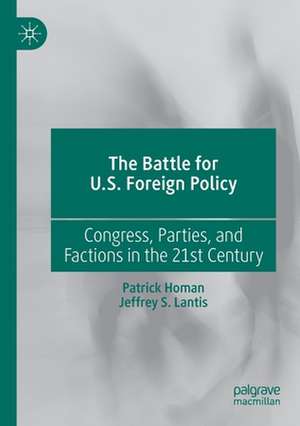The Battle for U.S. Foreign Policy: Congress, Parties, and Factions in the 21st Century
Autor Patrick Homan, Jeffrey S. Lantisen Limba Engleză Paperback – 20 dec 2020
| Toate formatele și edițiile | Preț | Express |
|---|---|---|
| Paperback (1) | 443.16 lei 6-8 săpt. | |
| Springer International Publishing – 20 dec 2020 | 443.16 lei 6-8 săpt. | |
| Hardback (1) | 576.20 lei 6-8 săpt. | |
| Springer International Publishing – 16 dec 2019 | 576.20 lei 6-8 săpt. |
Preț: 443.16 lei
Nou
Puncte Express: 665
Preț estimativ în valută:
84.84€ • 88.19$ • 70.34£
84.84€ • 88.19$ • 70.34£
Carte tipărită la comandă
Livrare economică 07-21 februarie 25
Preluare comenzi: 021 569.72.76
Specificații
ISBN-13: 9783030301736
ISBN-10: 3030301737
Pagini: 258
Ilustrații: XI, 258 p.
Dimensiuni: 148 x 210 mm
Greutate: 0.33 kg
Ediția:1st ed. 2020
Editura: Springer International Publishing
Colecția Palgrave Macmillan
Locul publicării:Cham, Switzerland
ISBN-10: 3030301737
Pagini: 258
Ilustrații: XI, 258 p.
Dimensiuni: 148 x 210 mm
Greutate: 0.33 kg
Ediția:1st ed. 2020
Editura: Springer International Publishing
Colecția Palgrave Macmillan
Locul publicării:Cham, Switzerland
Cuprins
1. Introduction: Congress, Factions, and the Battle for U.S. Foreign Policy.- 2. Factionalism and Foreign Policy: A Model of Minority Influence.- 3. “We the People?”: Historical Foundations of Factionalism.- 4. The Tea Party, the Freedom Caucus, and the Obama Administration.- 5. Progressive Caucus Activism During the Obama Administration.- 6. The Freedom Caucus and Factionalism in the Trump Era.- 7. Progressives and Foreign Policy in the Trump Era.- 8. Conclusion: The Battle Continues.
Notă biografică
Patrick Homan is Associate Professor of Political Science at Dominican University, USA
Jeffrey Lantis is Professor of Political Science and Chair of the Global & International Studies Program at The College of Wooster, USA
Jeffrey Lantis is Professor of Political Science and Chair of the Global & International Studies Program at The College of Wooster, USA
Textul de pe ultima copertă
This book is an original study of the contemporary debate over U.S. foreign policy between the president, members of Congress, and political parties. Specifically, it examines how factions at the ideological extremes within parties such as the Tea Party, the Freedom Caucus, and Progressive Democrats can play significant roles in shaping U.S. foreign policy. In today’s polarized atmosphere whereAmericans seem increasingly divided, factions are emerging as powerful insurgents, innovators, and engines of change. The book develops a minority theory of influence that recognizes the importance of traditional and nontraditional strategies including persuasion, legislation, and issue framing. Original case studies explore factions at work in foreign policy development during the Barack Obama and Donald Trump administrations, including struggles over immigration policy, trade agreements, development aid, and foreign policies toward Iran and Syria. The Battle for U.S. Foreign Policy captures the spirit of ideological and practical party struggles and fills a substantial gap in foreign policy analysis literature.
Caracteristici
Weaves theoretical perspectives together to advance a new model of factionalism in the battle for foreign policy Examine the origins of the Tea Party/Freedom Caucus and Progressive Democrats, as well as their primary motivations, choices of strategies, and the circumstances in which they are more likely to succeed Addresses Trump’s ascendancy to the national political stage and the rise of populism as an extension of these ideological struggles
